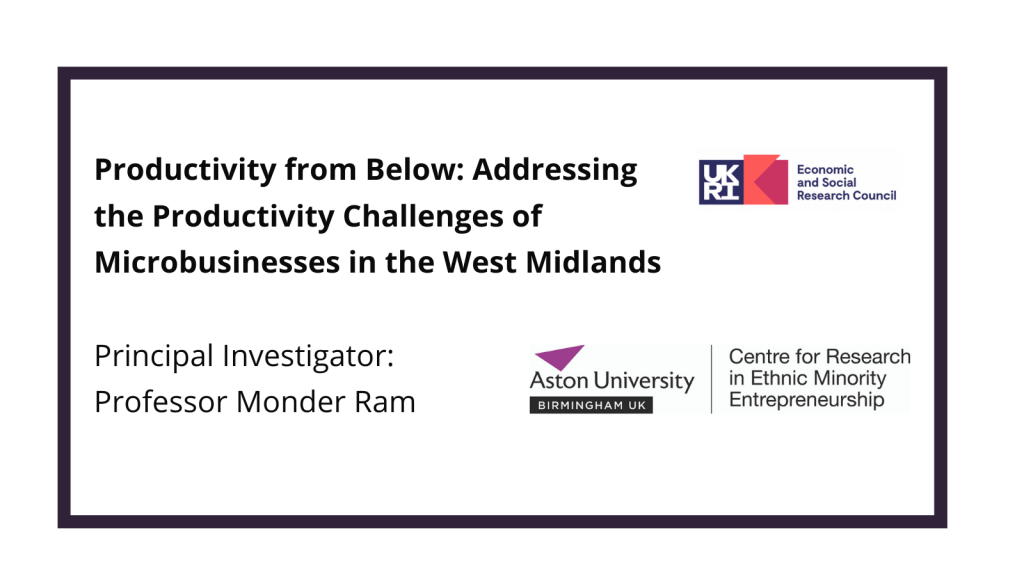
The Challenge
Microbusinesses, despite their significant economic contribution, often failed to attract policy attention. With over 1.1 million microbusinesses employing 4.1 million people (18.6% of all private sector employees) and contributing £55 billion in turnover, they represented a crucial segment of the economy. Many microbusinesses were concentrated in traditional sectors rather than the ‘new economy’ sectors that typically captured policymakers’ and practitioners’ attention.
Ethnic minority and migrant communities frequently owned and operated microbusinesses in these traditional sectors. However, even in superdiverse areas like the West Midlands, they rarely utilised mainstream business support programmes and initiatives. This created a knowledge gap regarding the role of trusted intermediaries in supporting such firms, often leading to their neglect. Additionally, the informal and opaque management processes and working practices of these businesses posed challenges for assessing productivity and performance, as conventional productivity measures often failed to capture their unique organisational methods.
Overview
Researchers from Aston, Birmingham, and Warwick University secured funding from the Economic and Social Research Council to develop productivity-boosting interventions to support microbusinesses (with 1-9 employees) in the West Midlands. The three-year project, based at the Aston Centre for Research in Ethnic Minority Entrepreneurship (CREME) and led by Professor Monder Ram, was conducted in collaboration with business and civil society partners. It focused on firms facing major challenges: retailers in deprived areas, the Bangladeshi catering sector, and creative businesses with owners and workers from deprived backgrounds—firms rarely featured in contemporary productivity debates and initiatives.
Methods and Participants
The project employed qualitative and quantitative methods co-produced with academic and non-academic partners to develop a detailed understanding of these firms’ management practices. The research particularly focused on how owners engaged their workforce to improve growth.
The aims of the project were threefold:
- To provide a detailed understanding of management and engagement practices and their relationship to productivity in microbusinesses, focusing on disadvantaged communities in hard-to-reach sectors (retail, catering, and creative enterprise). Surveys and case studies of business owners and workers were conducted, examining how management, working practices, and employee experiences related to firm performance.
- To ensure that the business support system was responsive to the needs of microbusinesses from disadvantaged communities. Researchers, business support specialists, and civil society agencies shared knowledge throughout the project, collectively developing policies to enhance support for microbusinesses.
- To deliver practical solutions to microbusinesses wishing to improve productivity and performance. Research and knowledge from interactions with policymakers informed the development of customised business support programmes for microbusinesses.
Fieldwork, Findings, and Outputs
The project produced significant practical outcomes by supporting evidence-based interventions that benefited businesses participating in customised programmes designed to upgrade leadership and management skills, thereby boosting productivity. Insights from their experiences promoted greater understanding of ‘what works,’ guiding practitioners in other contexts. The project also actively supported the development of a more responsive and inclusive business support ecosystem in the West Midlands by mobilising mainstream and non-traditional intermediaries through multiple engagement pathways. Knowledge and interventions from the project were co-produced by academic and non-academic partners.
This knowledge was shared with various business support providers to develop evidence-based solutions. The Aston Centre for Growth then provided customised support for microbusinesses based on these solutions.
Research Team
The project team was led by Professor Monder Ram, Director of CREME (Aston Business School [ABS]), and included Professor Mark Hart (ABS), Dr. Judy Scully (ABS), Dr. Luke Fletcher (ABS), Professor Anne Green (University of Birmingham), Dr. Imelda McCarthy (CREME), and Professor Stephen Roper (Warwick University). The team represented three leading applied research centres with distinct but complementary perspectives: the Centre for Research in Ethnic Minority Entrepreneurship (CREME, based at ABS), the Enterprise Research Centre (ERC, at ABS and Warwick University), and City-REDI (Regional Economic Development Institute, Birmingham University). They collaborated with non-academic partners, including Ashley Community Housing, the Bangladeshi Network, Citizens UK, and Punch Records. This collaboration aimed to create a business development intervention rooted in the concerns of neglected microbusinesses and scientific principles.
For More Information, contact:
Professor Monder Ram at m.ram1@aston.ac.uk or Dr. Imelda McCarthy at i.mccarthy@aston.ac.uk.
Learn More
Ram, M., McCarthy, I., Green, A., & Scully, J. (2022). Towards a more inclusive human resource community: Engaging ethnic minority microbusinesses in human resource development programmes targeted at more productive methods of operating. Human Resource Management Journal, 32(3), 540-554.
At the recent CIPD Applied Research Conference, some of the research team shared insights from the research to date.